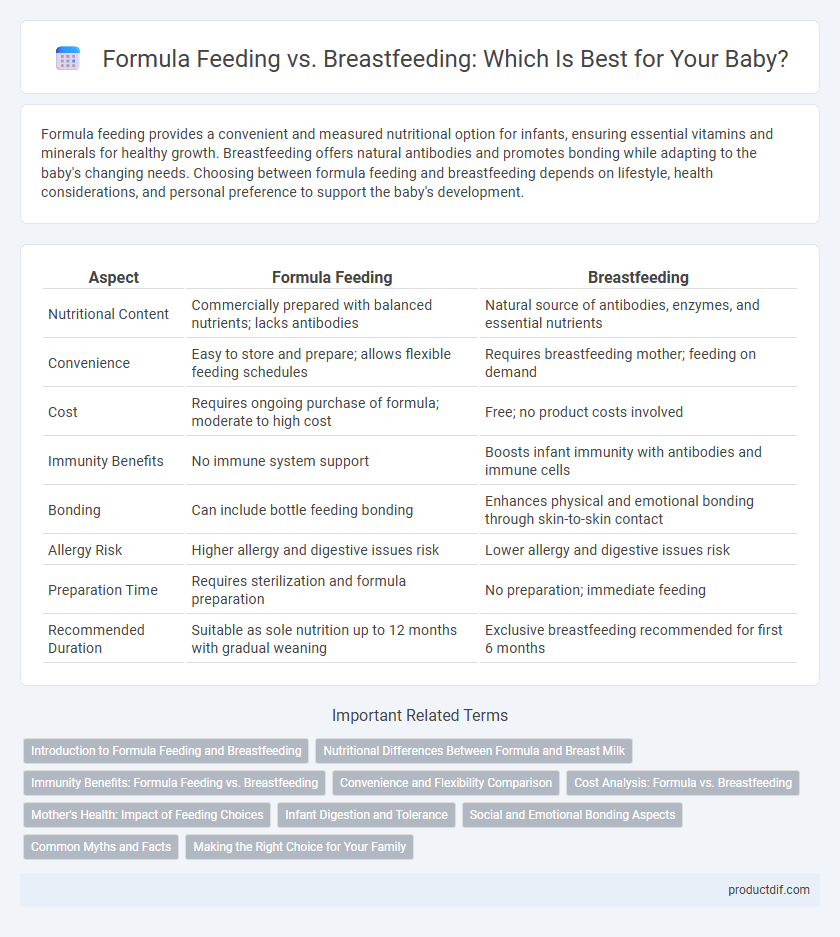Formula feeding provides a convenient and measured nutritional option for infants, ensuring essential vitamins and minerals for healthy growth. Breastfeeding offers natural antibodies and promotes bonding while adapting to the baby's changing needs. Choosing between formula feeding and breastfeeding depends on lifestyle, health considerations, and personal preference to support the baby's development.
Table of Comparison
| Aspect | Formula Feeding | Breastfeeding |
|---|---|---|
| Nutritional Content | Commercially prepared with balanced nutrients; lacks antibodies | Natural source of antibodies, enzymes, and essential nutrients |
| Convenience | Easy to store and prepare; allows flexible feeding schedules | Requires breastfeeding mother; feeding on demand |
| Cost | Requires ongoing purchase of formula; moderate to high cost | Free; no product costs involved |
| Immunity Benefits | No immune system support | Boosts infant immunity with antibodies and immune cells |
| Bonding | Can include bottle feeding bonding | Enhances physical and emotional bonding through skin-to-skin contact |
| Allergy Risk | Higher allergy and digestive issues risk | Lower allergy and digestive issues risk |
| Preparation Time | Requires sterilization and formula preparation | No preparation; immediate feeding |
| Recommended Duration | Suitable as sole nutrition up to 12 months with gradual weaning | Exclusive breastfeeding recommended for first 6 months |
Introduction to Formula Feeding and Breastfeeding
Formula feeding provides a convenient and scientifically formulated alternative to breast milk, offering essential nutrients like proteins, fats, vitamins, and minerals tailored for infant growth. Breastfeeding delivers natural antibodies and optimal nutrition directly from the mother, supporting immune development and bonding. Both methods play vital roles in infant health, with choices often influenced by lifestyle, medical conditions, and personal preference.
Nutritional Differences Between Formula and Breast Milk
Breast milk provides a dynamic blend of antibodies, enzymes, and essential fatty acids that adapt to an infant's nutritional needs and support immune development. Infant formula is fortified with standardized levels of key nutrients such as iron, vitamin D, and protein to approximate breast milk's composition but lacks the live immune factors found in natural breastfeeding. Nutritional differences influence digestion, allergy risks, and growth patterns, making personalized pediatric guidance crucial for feeding choices.
Immunity Benefits: Formula Feeding vs. Breastfeeding
Breastfeeding provides essential antibodies such as immunoglobulin A (IgA) that help protect infants from infections and strengthen their immune system. Formula feeding, while nutritionally designed to support growth, lacks live immune components but is often fortified with vitamins and minerals to promote overall health. Research consistently shows breastfeeding offers superior immune benefits by reducing risks of respiratory and gastrointestinal illnesses in babies.
Convenience and Flexibility Comparison
Formula feeding offers greater convenience and flexibility by allowing any caregiver to feed the baby without the need for the mother to be present, supporting diverse schedules and nighttime feedings. Breastfeeding requires the mother's availability and can limit feeding options outside the home, though it provides natural immunity benefits and personalized nutrition. Formula feeding products such as ready-to-use bottles and powdered formulas enhance portability and storage, making it easier for parents to manage feeding routines on the go.
Cost Analysis: Formula vs. Breastfeeding
Formula feeding incurs ongoing expenses averaging $1,200 to $1,500 annually for formula, bottles, and sterilization supplies, while breastfeeding requires minimal costs, primarily for nursing bras and potential lactation support. Breastfeeding offers significant financial savings by eliminating the need for formula purchases, but initial investments in breast pumps and accessories can range from $150 to $300. Evaluating overall cost-effectiveness, breastfeeding proves more economical, particularly over the first year of infant care.
Mother's Health: Impact of Feeding Choices
Formula feeding provides a controlled nutrient intake that can help mothers manage dietary concerns and physical health postpartum, especially when breastfeeding is challenging due to medical conditions. Breastfeeding promotes hormonal balance by releasing oxytocin, which aids uterine contraction and reduces postpartum bleeding, contributing positively to maternal recovery. Choosing between formula feeding and breastfeeding significantly influences maternal health outcomes, including energy levels, stress, and risk of certain diseases such as breast and ovarian cancer.
Infant Digestion and Tolerance
Breast milk contains easily digestible proteins and beneficial enzymes that promote optimal infant digestion and reduce the risk of gastrointestinal discomfort. Formula feeding uses modified cow's milk or plant-based proteins, which can alter digestion speed and sometimes lead to increased gas or constipation in sensitive infants. Research shows that breastfed babies typically have softer stools and better tolerance due to the presence of prebiotics and immunological factors in breast milk.
Social and Emotional Bonding Aspects
Formula feeding provides a nurturing experience through intentional eye contact, talking, and physical closeness during feeding moments, fostering strong social bonds between caregiver and baby. Breastfeeding inherently supports emotional connection by promoting skin-to-skin contact and releasing oxytocin, which enhances bonding and calms both mother and infant. Both feeding methods can be optimized to encourage secure attachment and emotional development by emphasizing responsive interactions and affectionate touch.
Common Myths and Facts
Formula feeding provides essential nutrients designed to support infant growth, yet myths claim it lacks the immune benefits of breastfeeding, which is scientifically proven to boost immunity and reduce infections. Contrary to common beliefs, modern formula closely mimics breast milk composition, offering a safe alternative when breastfeeding is not possible or preferred. Understanding facts about both feeding methods helps parents make informed decisions tailored to their baby's health needs.
Making the Right Choice for Your Family
Choosing between formula feeding and breastfeeding depends on your baby's nutritional needs, family lifestyle, and health considerations. Breastfeeding provides essential antibodies and fosters bonding, while formula feeding offers convenience and precise nutrient control for parents. Evaluating these factors helps families make an informed decision that supports their baby's growth and well-being.
Formula Feeding vs Breastfeeding Infographic

 productdif.com
productdif.com